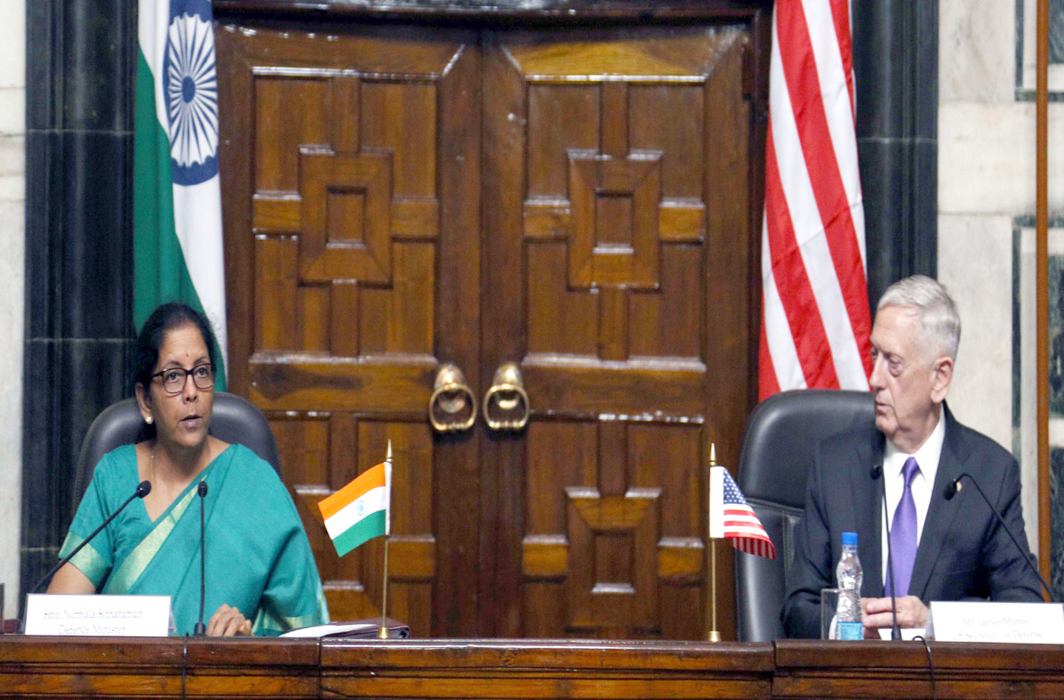[vc_row][vc_column][vc_column_text]Pak PM Shahid Khaqan Abbasi had recently said during a US visit that his government “will not accept military or political role” of India in Afghanistan
Days after Pakistan Prime Minister Shahid Khaqan Abbasi said that his government will “not accept a political or military role” of India in Afghanistan, Union defence minister Nirmala Sitharaman, on Tuesday, replied in the negative to questions on whether India was planning to deploy troops in Afghan territory.
Addressing the media during the joint press conference by her and James Mattis, the visiting Secretary of Defence, United States, Sitharaman said: “We have made it clear that there shall not be boots from India on the ground (in Afghanistan).”
Sitharaman, who became India’s first full-time woman defence minister earlier this month, held her first bilateral defence partnership talks with her American counterpart during the day. Mattis had arrived in New Delhi on Tuesday morning for a two-day bilateral visit.
During the talks between the defence ministers of the two countries, ways were discussed to deepen Indo-US defence ties. Key issues such as India’s role in Afghanistan and the place that New Delhi finds in the recently unveiled Afghan policy of US President Donald Trump was also a point of discussion along with the prickly issue of terrorism emanating from Pakistan. Mattis is the first member of the Trump administration to visit India for bilateral talks.
“The situation in our neighbourhood and the growing menace of cross-border terrorism were discussed in depth. There is growing convergence in the approaches of both our countries on this issue,” Nirmala said the joint press conference that was convened after her talks with Mattis.
She said both sides recognise the importance of holding those who use terrorism as an instrument of state policy to account and to dismantle the infrastructure that supports terrorism.
On his part, Mattis said there can be “no tolerance to terrorism safe havens”. He also welcomed India’s contribution in war-torn Afghanistan.
Here’s the full text of the statement issued by Nirmala Sitharaman at the joint press conference:[/vc_column_text][vc_column_text css=”.vc_custom_1506434778249{padding-top: 5px !important;padding-right: 5px !important;padding-bottom: 5px !important;padding-left: 5px !important;background-color: #a2b1bf !important;border-radius: 5px !important;}”]Ladies and gentlemen,
It is indeed a privilege to receive Secretary Mattis in Delhi. I extend a warm welcome to him on his first visit to India as Secretary of Defence.
He is a special visitor for me personally as he is the first Ministerial counterpart I have met since taking over my responsibility as Defence Minister of India.
We have just concluded very substantive, constructive and forward-looking talks. I thank Secretary Mattis for generously sharing his deep knowledge and wisdom of defence matters. I am confident that his knowledge and experience will contribute to further deepening defence and security cooperation between India and the United States.
Ladies and Gentlemen,
India and the United States share a strong and vibrant strategic partnership. As the world’s largest democracies, we also share fundamental values and interests.
Defence cooperation between India and the US has grown significantly in recent years and emerged as a key pillar of our strategic partnership.
Our military-to-military engagement continues to grow. We recently concluded the trilateral Malabar Naval Exercise in the Bay of Bengal along with Japan. This edition of Malabar demonstrated the progress made in operational synergies between our Navies. As we speak, our Armies are conducting their Exercise Yudh Abhyas. In our talks today, we agreed to explore additional, specialized exercises.
Cooperation in defence equipment has grown steadily over the past years. The US is now a leading supplier of state-of-the-art defence equipment to India. I appreciated Secretary Mattis’ willingness to share further cutting-edge platforms which would enhance India’s defence preparedness to meet current and emerging threats.
Secretary Mattis and I agreed that we need to expand on the progress already made by encouraging co-production and co-development efforts. I reiterated India’s deep interest in enhancing defence manufacturing in India under Prime Minister’s Make in India initiative. I thank Secretary Mattis for his supportive position in this regard and look forward to working closely with him to realize joint projects.
In this context, we agreed that the full implementation of the understanding reached following the announcement by the US last year recognizing India as a Major Defence Partner will provide further energy and momentum to our collaboration on defence technology and manufacturing.
We also discussed how to refocus and re-energize the Defence Technology and Trade Initiative (DTTI) as a mechanism to promote technology sharing as well as co development and co-production efforts.
We also exchanged views on regional and international issues of mutual interest. The situation in our neighbourhood and the growing menace of cross-border terrorism were discussed in depth. There is growing convergence in the approaches of both our countries on this issue. We both recognize the importance of holding those who use terrorism as an instrument of state policy to account and to dismantle the infrastructure that supports terrorism.
As you are aware, India welcomed President Trump’s new US Strategy for Afghanistan announced last month. Today, I had useful discussions with Secretary Mattis on how we could strengthen our cooperation bilaterally as well as with the Government of Afghanistan in pursuit of our common objective of a peaceful, democratic, stable and prosperous Afghanistan.
We also discussed the issues relating to maritime security in the Indian Ocean and the broader Asia-Pacific Region as well as regional connectivity issues. India supports the freedom of navigation, over-flight and unimpeded lawful commerce. We also believe that disputes should be resolved through peaceful means and in accordance with the universally recognized principles of international law. I am happy to note that Secretary Mattis reaffirmed the US position in support of these principles. I also welcome his reiteration of the US commitment to work with India in ensuring maritime security in the Indo-Pacific and as first responder to HADR situations.
From our discussions today, I am confident that we are entering a new phase in our strategic defence partnership with the United States. I once again thank Secretary Mattis for visiting India. I also thank him for inviting me to visit the United States to carry forward our discussions.[/vc_column_text][/vc_column][/vc_row]


 India News23 hours ago
India News23 hours ago
 Cricket news22 hours ago
Cricket news22 hours ago
 India News21 hours ago
India News21 hours ago
 Latest world news9 hours ago
Latest world news9 hours ago
 Latest world news9 hours ago
Latest world news9 hours ago
 Latest world news9 hours ago
Latest world news9 hours ago
 India News9 hours ago
India News9 hours ago
 India News4 mins ago
India News4 mins ago












